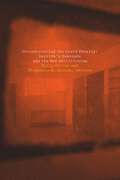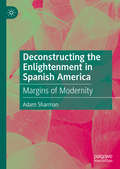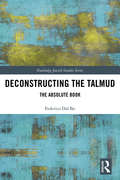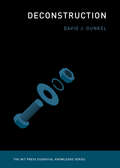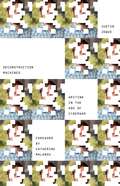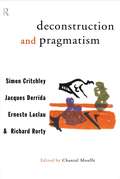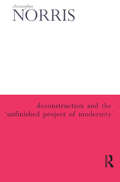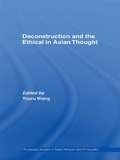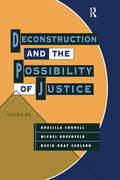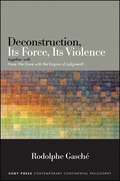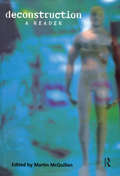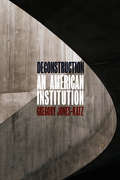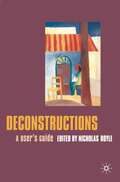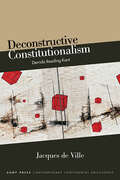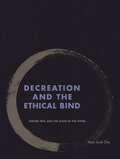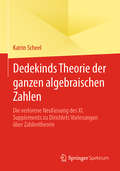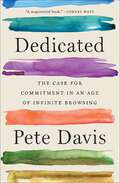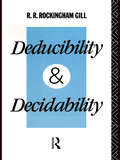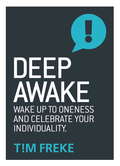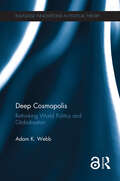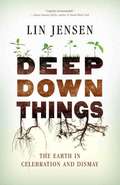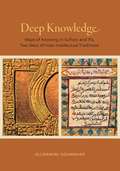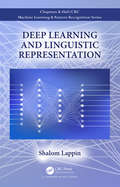- Table View
- List View
Deconstructing the Death Penalty: Derrida's Seminars and the New Abolitionism
by Kelly Oliver, Stephanie M. StraubThis volume represents the first collection of essays devoted exclusively to Jacques Derrida's Death Penalty Seminars, conducted from 1999 to 2001. The volume includes essays from a range of scholars working in philosophy, law, Francophone studies, and comparative literature, including established Derridians, activist scholars, and emerging scholars. These essays attempt to elucidate and expand upon Derrida's deconstruction of the theologico-political logic of the death penalty in order to construct a new form of abolitionism, one not rooted in the problematic logics of sovereign power. These essays provide remarkable insight into Derrida’s ethical and political projects; this volume will not only explore the implications of Derrida’s thought on capital punishment and mass incarceration, but will also help to further elucidate the philosophical groundwork for his later deconstructions of sovereign power and the human/animal divide. Because Derrida is deconstructing the logic of the death penalty, rather than the death penalty itself, his seminars will prove useful to scholars and activists opposing all forms of state sanctioned killing. In compiling this volume, our goals were twofold: first, to make a case for Derrida's continuing importance in debates on capital punishment, mass incarceration, and police brutality, and second, to construct a new, versatile abolitionism, one capable of confronting all forms the death penalty might take.
Deconstructing the Enlightenment in Spanish America: Margins of Modernity
by Adam SharmanThis book is about Enlightenment culture in Spanish America before Independence—in short, there where, according to Hegel, one would least expect to find it. It explores the Enlightenment in texts from five cultural fields: science, history, the periodical press, law, and literature. Texts include the journals of the geodesic expedition to Quito, philosophical histories of the Americas, a year’s work from the Mercurio Peruano, the writings of Mariano Moreno, and Lizardi’s El periquillo sarniento. Each chapter takes one field, one body of writing, and one key question: Is modern science universal? Can one disavow the discourse of progress? What is a “Catholic” Enlightenment? Are Enlightenment reason and sovereignty monological? Must the individual be the normative subject of modernity? The book’s premise is that the above texts not only speak to the contradictions of a doubtless marginalised colonial American Ilustración but illuminate the constitutive aporias of the so-called modern project itself. Drawing on the work of Derrida, but also on both historical and philosophical accounts of the various Enlightenments, this incisive book will be of interest to students of Spanish America and scholars in the fields of postcolonialism and the Enlightenment.
Deconstructing the Talmud: The Absolute Book (Routledge Jewish Studies Series)
by Federico Dal BoThis monograph uses deconstruction—a philosophical movement originated by Jacques Derrida—to read the most authoritative book in Judaism: the Talmud. Examining deconstruction in comparison with Kant’s and Hegel’s philosophies, the volume argues that the movement opens an innovative debate on Jewish Law. First, the monograph interprets deconstruction within the major streams of continental philosophy; then, it criticizes many aspects of Foucault’s and Agamben’s philosophy, rejecting their notion of law. On these premises, the research delivers a close examination of many fundamental aspects of the Talmud. Consequently, it provides a short history of Rabbinic literature, a history of the dissemination of the Talmud from Babylon to Northern France, and an analysis of Talmudic vocabulary from a deconstructive perspective. Each key concept of the Talmud is analysed according to the deconstructive dialectics between orality and writing. Closing with a comparison between the Talmud and Derrida’s most enigmatic text, Glas, the study argues that deconstruction dismantles the traditional notion of the Talmud to outline a new approach to Jewish Law. Reading the Talmud through deconstruction, this new angle makes the volume an essential resource for students and scholars interested in Jewish studies, continental philosophy, and the Middle East.
Deconstruction (The MIT Press Essential Knowledge series)
by David J. GunkelAn accessible introduction to a concept often considered impossibly abstruse, demonstrating its power as a conceptual tool in the twenty-first century.This volume in the MIT Press Essential Knowledge series offers a clear and concise introduction to a topic often considered difficult and abstruse: deconstruction. David Gunkel sorts out the concept, terminology, and practices of deconstruction, not to defend academic orthodoxy, or to disseminate the thought of Jacques Derrida--the fabricator of the neologism and progenitor of the concept--but to provide readers with a powerful conceptual tool for the twenty-first century. Gunkel explains that deconstruction is not simply the opposite of construction--the "deconstructed" jacket hanging in your closet is not, strictly speaking, accurately named--or synonymous with destruction. It is a way to think beyond the construction/destruction dichotomy and all other conceptual dichotomies and logical oppositions. After describing what deconstruction is not, and developing an abstract and schematic characterization derived from Derrida, Gunkel offers examples in (rather than of) deconstruction, including logocentrism (the speech/writing dichotomy) and virtuality (the ruling philosophical binary of real/appearance), remix (the original/copy distinction), and the posthuman figure of the cyborg (the human/machine conceptual pairing). Finally, Gunkel discusses the costs and benefits of deconstruction, considering the many things deconstruction is good for and identifying potential problems, including Eurocentrism, relativism, difficulties in communicating the concept, and reappropriation.
Deconstruction Machines: Writing in the Age of Cyberwar (Electronic Mediations #54)
by Justin JoqueA bold new theory of cyberwar argues that militarized hacking is best understood as a form of deconstruction From shadowy attempts to steal state secrets to the explosive destruction of Iranian centrifuges, cyberwar has been a vital part of statecraft for nearly thirty years. But although computer-based warfare has been with us for decades, it has changed dramatically since its emergence in the 1990s, and the pace of change is accelerating.In Deconstruction Machines, Justin Joque inquires into the fundamental nature of cyberwar through a detailed investigation of what happens at the crisis points when cybersecurity systems break down and reveal their internal contradictions. He concludes that cyberwar is best envisioned as a series of networks whose constantly shifting connections shape its very possibilities. He ultimately envisions cyberwar as a form of writing, advancing the innovative thesis that cyber attacks should be seen as a militarized form of deconstruction in which computer programs are systems that operate within the broader world of texts. Throughout, Joque addresses hot-button subjects such as technological social control and cyber-resistance entities like Anonymous and Wikileaks while also providing a rich, detailed history of cyberwar. Deconstruction Machines provides a necessary new interpretation of deconstruction and timely analysis of media, war, and technology.
Deconstruction and Pragmatism
by Jacques Derrida Simon Critchley Richard Rorty Ernesto LaclauDeconstruction and pragmatism constitute two of the major intellectual influences on the contemporary theoretical scene; influences personified in the work of Jacques Derrida and Richard Rorty. Both Rortian pragmatism, which draws the consequences of post-war developments in Anglo-American philosophy, and Derridian deconstruction, which extends and troubles the phonomenological and Heideggerian influence on the Continental tradition, have hitherto generally been viewed as mutually exclusive philosophical language games.The purpose of this volume is to bring deconstruction and pragmatism into critical confrontation with one another through staging a debate between Derrida and Rorty, itself based on discussions that took place at the College International de Philosophie in Paris in 1993. The ground for this debate is layed out in introductory papers by Simon Critchley and Ernesto Laclau, and the remainder of the volume records Derrida's and Rorty's responses to each other's work. Chantal Mouffe gives an overview of the stakes of this debate in a helpful preface.
Deconstruction and the 'Unfinished Project of Modernity'
by Christopher NorrisThrough a close engagement with some key thinkers, Norris argues that deconstruction is part of the "unfinished project of modernity." a project whose interest and values it upholds by continuing to question them in a spirit of enlightened self-critical inquiry.
Deconstruction and the Ethical in Asian Thought
by Youru WangThe striking parallels between Derrida’s deconstruction and certain strategies eschewing oppositional hierarchies in Asian thought, especially in Buddhism and Daoism, have attracted much attention from scholars of both Western and Asian philosophy. This book contributes to this discussion by focusing on the ethical dimension and function of deconstruction in Asian thought. Examining different traditions and schools of Asian thought, including Indian Buddhism, Zen, other schools of East Asian Buddhism, the Kyoto School, and Daoism, the contributors explore the central theme from different contexts and different angles. Insights and notions from the contemporary discussion of Derridean deconstruction and its ethic or Derridean-Levinasian ethic as a paradigm for comparison or interpretation are used as a framework. Furthering our understanding of the relationship between deconstruction and the ethical in Asian traditions, this book also enriches the contemporary ethical discourse from a global perspective by bridging Asia and the West.
Deconstruction and the Possibility of Justice
by Michel Rosenfeld David Gray Carlson Drucilla CorbellFirst published in 1993. Routledge is an imprint of Taylor & Francis, an informa company.
Deconstruction, Its Force, Its Violence: together with "Have We Done with the Empire of Judgment?" (SUNY series in Contemporary Continental Philosophy)
by Rodolphe GaschéIn this book, Rodolphe Gasché returns to some of the founding texts of deconstruction to propose a new and broader way of understanding it—not as an operation or method to reach an elusive outside, or beyond, of metaphysics, but as something that takes place within it. Rather than unraveling metaphysics, deconstruction loosens its binary and hierarchical conceptual structure. To make this case, Gasché focuses on the concepts of force and violence in the work of Jacques Derrida, looking to his essays "Force and Signification" and "Force of Law," and his reading on Of Grammatology in Claude Lévi-Strauss's autobiographical Tristes Tropiques. The concept of force has not drawn extensive scrutiny in Derrida scholarship, but it is crucial to understanding how, by way of spacing and temporizing, philosophical opposition is reinscribed into a differential economy of forces. Gasché concludes with an essay addressing the question of deconstruction and judgment and considers whether deconstruction suspends the possibility of judgment, or whether it is, on the contrary, a hyperbolic demand for judgment.
Deconstruction: A Reader
by Martin McQuillanFirst published in 2001. Routledge is an imprint of Taylor & Francis, an informa company.
Deconstruction: An American Institution
by Gregory Jones-KatzThe basic story of the rise, reign, and fall of deconstruction as a literary and philosophical groundswell is well known among scholars. In this intellectual history, Gregory Jones-Katz aims to transform the broader understanding of a movement that has been frequently misunderstood, mischaracterized, and left for dead—even as its principles and influence transformed literary studies and a host of other fields in the humanities. ?Deconstruction begins well before Jacques Derrida’s initial American presentation of his deconstructive work in a famed lecture at Johns Hopkins University in 1966 and continues through several decades of theoretic growth and tumult. While much of the subsequent story remains focused, inevitably, on Yale University and the personalities and curriculum that came to be lumped under the “Yale school” umbrella, Deconstruction makes clear how crucial feminism, queer theory, and gender studies also were to the lifeblood of this mode of thought. Ultimately, Jones-Katz shows that deconstruction in the United States—so often caricatured as a French infection—was truly an American phenomenon, rooted in our preexisting political and intellectual tensions, that eventually came to influence unexpected corners of scholarship, politics, and culture.
Deconstructions
by Nicholas RoyleDeconstructions: A User's Guide is a new and unusual kind of book. At once a reference work and a series of inventive essays opening up new directions for deconstruction, it is intended as an authoritative and indispensable guide. With a helpful introduction and specially commissioned essays by leading figures in the field, Deconstructions offers lucid and compelling accounts of deconstruction in relation to a wide range of topics and discourses. Subjects range from the obvious (feminism, technology, postcolonialism) to the less so (drugs, film, weaving). Backed up by an unusually detailed index, this User's Guide demonstrates the innumerable and altering contexts in which deconstructive thinking and practice are at work, both within and beyond the academy, both within and beyond what is called 'the West'.
Deconstructive Constitutionalism: Derrida Reading Kant (SUNY series in Contemporary Continental Philosophy)
by Jacques de VilleDeconstructive Constitutionalism explores the relationship between the thinking of Immanuel Kant and Jacques Derrida concerning modern constitutionalism. Kant is widely recognized as one of the philosophical forebears of modern constitutionalism; that is, the notion that state powers should be defined and limited through a constitution. Kant laid the foundation of constitutionalism through his exposition of freedom, practical reason, and moral law. However, constitutionalism is under severe strain due to the challenges posed by inter alia climate change, global health, global conflict, authoritarianism, authoritarian populism, religious fundamentalism, migration, and inequality. Deconstructive Constitutionalism investigates, by way of Derrida's engagements with Kant, how the foundations of constitutionalism can be conceived differently to address some of these twenty-first-century challenges. The book examines the possible implications of such a re-reading of Kant for democracy, the human-animal relation, criminal law and punishment, as well as for a global constitutional order.
Decreation and the Ethical Bind: Simone Weil and the Claim of the Other
by Yoon Sook ChaIn Simone Weil’s philosophical and literary work, obligation emerges at the conjuncture of competing claims: the other’s self-affirmation and one’s own dislocation; what one has and what one has to give; a demand that asks for too much and the extraordinary demand implied by asking nothing. The other’s claims upon the self—which induce unfinished obligation, unmet sleep, hunger—drive the tensions that sustain the scene of ethical relationality at the heart of this book.Decreation and the Ethical Bind is a study in decreative ethics in which self-dispossession conditions responsiveness to a demand to preserve the other from harm. In examining themes of obligation, vulnerability, and the force of weak speech that run from Levinas to Butler, the book situates Weil within a continental tradition of literary theory in which writing and speech articulate ethical appeal and the vexations of response. It elaborates a form of ethics that is not grounded in subjective agency and narrative coherence but one that is inscribed at the site of the self’s depersonalization.
Dedekinds Theorie der ganzen algebraischen Zahlen: Die verlorene Neufassung des XI. Supplements zu Dirichlets Vorlesungen über Zahlentheorie
by Katrin ScheelDieses Buch stellt anhand des Nachlasses von Richard Dedekind eine Rekonstruktion des überarbeiteten XI. Supplements zur geplanten 5. Auflage von P. G. Lejeune Dirichlets Vorlesungen über Zahlentheorie mit einem Kommentar von Peter Ullrich zur Verfügung. Die von Dedekind herausgegebenen und erweiterten "Vorlesungen über Zahlentheorie" seines Lehrers Dirichlet und vor allem die umfangreichen angefügten Supplemente gelten als eines der Hauptwerke Dedekinds. Für die Geschichte der modernen Algebra ist das XI. Supplement "Über die Theorie der ganzen algebraischen Zahlen" von besonderem Interesse, da es die Begründung der Idealtheorie darstellt. Dedekind bereitete zu Beginn des 20. Jahrhunderts eine 5. Auflage der Vorlesungen von Dirichlet mit überarbeiteten Supplementen vor, die aber nicht mehr veröffentlicht wurde. Die Autorin dieses Bandes hat die Transkriptionsarbeiten und Editierung aus dem Dedekind Nachlass vorgenommen und ein einführendes Kapitel hinzugefügt.
Dedh Sayani: डेढ़ सयानी
by Ashfaq Ahmad"डेढ़ सयानी" अशफ़ाक़ अहमद द्वारा लिखी गई एक ऐसी पुस्तक है जो जीवन की सूक्ष्मताओं और मानवीय स्वभाव को बड़े ही रोचक और व्यंग्यात्मक ढंग से प्रस्तुत करती है। इस पुस्तक में कई छोटी-छोटी कहानियाँ या निबंध शामिल हैं, जिनमें समाज, रिश्तों, और जीवन के विभिन्न पहलुओं पर गहरी अंतर्दृष्टि दी गई है। अशफ़ाक़ अहमद की लेखनी में हास्य का पुट होने के साथ-साथ एक विशेष प्रकार की सूफियाना समझ भी है, जो पाठक को न केवल हंसाती है बल्कि उन्हें जीवन के गहरे और विचारोत्तेजक सत्य से भी रूबरू कराती है। "डेढ़ सयानी" में वे साधारण जीवन के असाधारण पहलुओं को उजागर करते हैं, और हर कहानी या निबंध के माध्यम से एक संदेश या सीख प्रस्तुत करते हैं। इस पुस्तक में हास्य और व्यंग्य के माध्यम से मानवीय कमजोरियों, समाज की विडंबनाओं, और जीवन के उन पहलुओं को दिखाया गया है जिन्हें हम अक्सर अनदेखा कर देते हैं। "डेढ़ सयानी" न केवल मनोरंजन करती है, बल्कि जीवन को एक नए दृष्टिकोण से देखने का अवसर भी प्रदान करती है। यह पुस्तक उन लोगों के लिए खास है जो सरल, सटीक और विचारशील लेखन पसंद करते हैं, और जो जीवन के गहरे अर्थों को समझने के इच्छुक हैं।
Dedicated: The Case for Commitment in an Age of Infinite Browsing
by Pete DavisA profoundly inspiring and transformative argument that purposeful commitment and civic engagement can be a powerful force in today&’s age of restlessness and indecision.Most of us have had this experience: browsing through countless options on Netflix, unable to commit to watching any given movie—and losing so much time skimming reviews and considering trailers that it&’s too late to watch anything at all. In a book inspired by an idea first articulated in a viral commencement address, Pete Davis argues that this is the defining characteristic of the moment: keeping our options open. We are stuck in &“Infinite Browsing Mode&”—swiping through endless dating profiles without committing to a single partner, jumping from place to place searching for the next big thing, and refusing to make any decision that might close us off from an even better choice we imagine is just around the corner. This culture of restlessness and indecision, Davis argues, is causing tension in the lives of young people today: We want to keep our options open, and yet we yearn for the purpose, community, and depth that can only come from making deep commitments. In Dedicated, Davis examines this quagmire, as well as the counterculture of committers who have made it to the other side. He shares what we can learn from the &“long-haul heroes&” who courageously commit themselves to particular places, professions, and causes—who relinquish the false freedom of an open future in exchange for the deep fulfillment of true dedication. Weaving together examples from history, personal stories, and applied psychology, Davis&’s &“insightful without being preachy…guide to commitment should be on everyone&’s reading list&” (Booklist, starred review).
Deducibility and Decidability
by R. R. GillThis book presents the results of these thinkers in a newly unified manner and displays their significance for the philosophy of mathematics.
Deep Awake: Wake Up to Onesess and Become a Lover of Life
by Tim FrekeAs the author of more than 20 books on the world's spiritual traditions, Tim Freke is in a unique position to present a revolutionary new approach to spiritual awakening. With astonishing clarity and directness he explains why popular spiritual teachings that urge us to reject the mind, attack the ego and detach from the vicissitudes of life are misguided. Using the powerful tool of 'paralogical thinking', he reveals that everyone has both a 'deep I' and a 'personal self'. The deep I is our spiritual essence, which is one with everyone and everything. We experience the deep I as a feeling of limitless love. The personal self by contrast is our tender humanity; it feels pleasure and pain, hope and heartache, love and loss. The personal self feels separate from the world. Tim's powerful paralogical insights reveal that the personal self is not an obstacle to our spiritual essence which must be overcome but rather a doorway to the deep I. Indeed, it is only through the personal self that we can find and then embody the deep I in our lives. The ego is not the villain but rather the hero of the spiritual journey. When we are deep awake, we wake up to oneness and celebrate separateness. We embrace both our spirituality and our humanity. Authentic spirituality is not about detaching ourselves from life, but about wholeheartedly diving in so that we can express our deep love and our unique human passion in the world.
Deep Cosmopolis: Rethinking World Politics and Globalisation (Routledge Innovations in Political Theory)
by Adam K. WebbToo often, observers of globalization take for granted that the common ground across cultures is a thin layer of consumerism and perhaps human rights. If so, then anything deeper and more traditional would be placebound, and probably destined for the dustbin of history. But must this be so? Must we assume--as both liberals and traditionalists now tend to do--that one cannot be a cosmopolitan and take traditions seriously at the same time? This book offers a radically different argument about how traditions and global citizenship can meet, and suggests some important lessons for the contours of globalization in our own time. Adam K. Webb argues that if we look back before modernity, we find a very different line of thinking about what it means to take the whole world as one’s horizon. Digging into some fascinating currents of thought and practice in the ancient world, the Middle Ages, and the early modern period, across all major civilizations, Webb is able to reveal patterns of "deep cosmopolitanism", with its logic quite unlike that of liberal globalization today. In their more cosmopolitan moments, everyone from clerics to pilgrims to empire-builders was inclined to look for deep ethical parallels—points of contact—among civilizations and traditions. Once modernity swept aside the old civilizations, however, that promise was largely forgotten. We now have an impoverished view of what it means to embrace a tradition and even what kinds of conversations across traditions are possible. In part two, Webb draws out the lessons of deep cosmopolitanism for our own time. If revived, it has something to say about everything from the rise of new non-Western powers like China and India and what they offer the world, to religious tolerance, to global civil society, to cross-border migration. Deep Cosmopolis traces an alternative strand of cosmopolitan thinking that cuts across centuries and civilizations. It advances a new perspective on world history, and a distinctive vision of globalization for this century which has the real potential to resonate with us all.
Deep Cosmopolis: Rethinking World Politics and Globalisation (Routledge Innovations in Political Theory)
by Adam K. WebbToo often, observers of globalization take for granted that the common ground across cultures is a thin layer of consumerism and perhaps human rights. If so, then anything deeper and more traditional would be placebound, and probably destined for the dustbin of history. But must this be so? Must we assume--as both liberals and traditionalists now tend to do--that one cannot be a cosmopolitan and take traditions seriously at the same time? This book offers a radically different argument about how traditions and global citizenship can meet, and suggests some important lessons for the contours of globalization in our own time.Adam K. Webb argues that if we look back before modernity, we find a very different line of thinking about what it means to take the whole world as one’s horizon. Digging into some fascinating currents of thought and practice in the ancient world, the Middle Ages, and the early modern period, across all major civilizations, Webb is able to reveal patterns of "deep cosmopolitanism", with its logic quite unlike that of liberal globalization today. In their more cosmopolitan moments, everyone from clerics to pilgrims to empire-builders was inclined to look for deep ethical parallels—points of contact—among civilizations and traditions. Once modernity swept aside the old civilizations, however, that promise was largely forgotten. We now have an impoverished view of what it means to embrace a tradition and even what kinds of conversations across traditions are possible. In part two, Webb draws out the lessons of deep cosmopolitanism for our own time. If revived, it has something to say about everything from the rise of new non-Western powers like China and India and what they offer the world, to religious tolerance, to global civil society, to cross-border migration.Deep Cosmopolis traces an alternative strand of cosmopolitan thinking that cuts across centuries and civilizations. It advances a new perspective on world history, and a distinctive vision of globalization for this century which has the real potential to resonate with us all.
Deep Down Things
by Lin JensenBeloved and critically acclaimed author Lin Jensen returns with this bounteous volume exploring what the poet Gerard Manley Hopkins calls "deep down things." Richly informed by deep ecology, Lin's writing explores our intimate connection to the land, to the specificities of place, and to the living earth itself-all as Lin uncovers our own deepest nature, the true heart of what it means to be human. There is much in what's happening in our environment now that can and perhaps should be cause for dismay - and Deep Down Things looks squarely at all of this and nonetheless gives us ample cause for celebration.
Deep Knowledge: Ways of Knowing in Sufism and Ifa, Two West African Intellectual Traditions (Africana Religions)
by Oludamini OgunnaikeThis book is an in-depth, comparative study of two of the most popular and influential intellectual and spiritual traditions of West Africa: Tijani Sufism and Ifa. Employing a unique methodological approach that thinks with and from—rather than merely about—these traditions, Oludamini Ogunnaike argues that they contain sophisticated epistemologies that provide practitioners with a comprehensive worldview and a way of crafting a meaningful life.Using theories belonging to the traditions themselves as well as contemporary oral and textual sources, Ogunnaike examines how both Sufism and Ifa answer the questions of what knowledge is, how it is acquired, and how it is verified. Or, more simply: What do you know? How did you come to know it? How do you know that you know? After analyzing Ifa and Sufism separately and on their own terms, the book compares them to each other and to certain features of academic theories of knowledge. By analyzing Sufism from the perspective of Ifa, Ifa from the perspective of Sufism, and the contemporary academy from the perspective of both, this book invites scholars to inhabit these seemingly “foreign” intellectual traditions as valid and viable perspectives on knowledge, metaphysics, psychology, and ritual practice.Unprecedented and innovative, Deep Knowledge makes a significant contribution to cross-cultural philosophy, African philosophy, religious studies, and Islamic studies. Its singular approach advances our understanding of the philosophical bases underlying these two African traditions and lays the groundwork for future study.
Deep Learning and Linguistic Representation (Chapman And Hall/crc Machine Learning And Pattern Recognition Ser.)
by Shalom LappinThe application of deep learning methods to problems in natural language processing has generated significant progress across a wide range of natural language processing tasks. For some of these applications, deep learning models now approach or surpass human performance. While the success of this approach has transformed the engineering methods of machine learning in artificial intelligence, the significance of these achievements for the modelling of human learning and representation remains unclear. Deep Learning and Linguistic Representation looks at the application of a variety of deep learning systems to several cognitively interesting NLP tasks. It also considers the extent to which this work illuminates our understanding of the way in which humans acquire and represent linguistic knowledge. Key Features: combines an introduction to deep learning in AI and NLP with current research on Deep Neural Networks in computational linguistics. is self-contained and suitable for teaching in computer science, AI, and cognitive science courses; it does not assume extensive technical training in these areas. provides a compact guide to work on state of the art systems that are producing a revolution across a range of difficult natural language tasks.
